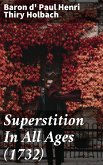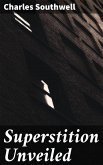In "Superstition in All Ages," Paul Henri Thiry baron d'Holbach presents a rigorous examination of the role of superstition throughout human history, articulating how it has shaped societies and influenced individual behavior. Written in a clear yet incisive literary style indicative of the Enlightenment, d'Holbach critiques religious and superstitious beliefs that have pervaded cultures from ancient times to his own, emphasizing a rationalist perspective that champions reason over faith. The text is rich with historical anecdotes, philosophical arguments, and a systematic deconstruction of superstitions, making it a seminal work in the inventory of Enlightenment thought that interrogates the lingering shadow of ignorance amidst the advancement of science and reason. Baron d'Holbach, a prominent figure in the French Enlightenment, was deeply influenced by the rise of rationalist thinking and the scientific revolution that characterized his era. As an outspoken advocate for atheism and materialism, d'Holbach's philosophical upbringing provided him with the tools to critique dogmatic systems of belief, positioning him as a key intellectual in the push toward secular humanism. His vibrant social network, which included luminaries such as Voltaire and Rousseau, likely encouraged his pursuit of such a profound subject. This book is recommended for readers interested in Enlightenment philosophies, religious studies, and the historical interplay between superstition and reason. D'Holbach's arguments challenge readers to reflect critically on their own beliefs, making it a timeless piece that invites dialogue on faith, reason, and the evolution of human thought.
Dieser Download kann aus rechtlichen Gründen nur mit Rechnungsadresse in A, B, BG, CY, CZ, D, DK, EW, E, FIN, F, GR, H, IRL, I, LT, L, LR, M, NL, PL, P, R, S, SLO, SK ausgeliefert werden.









